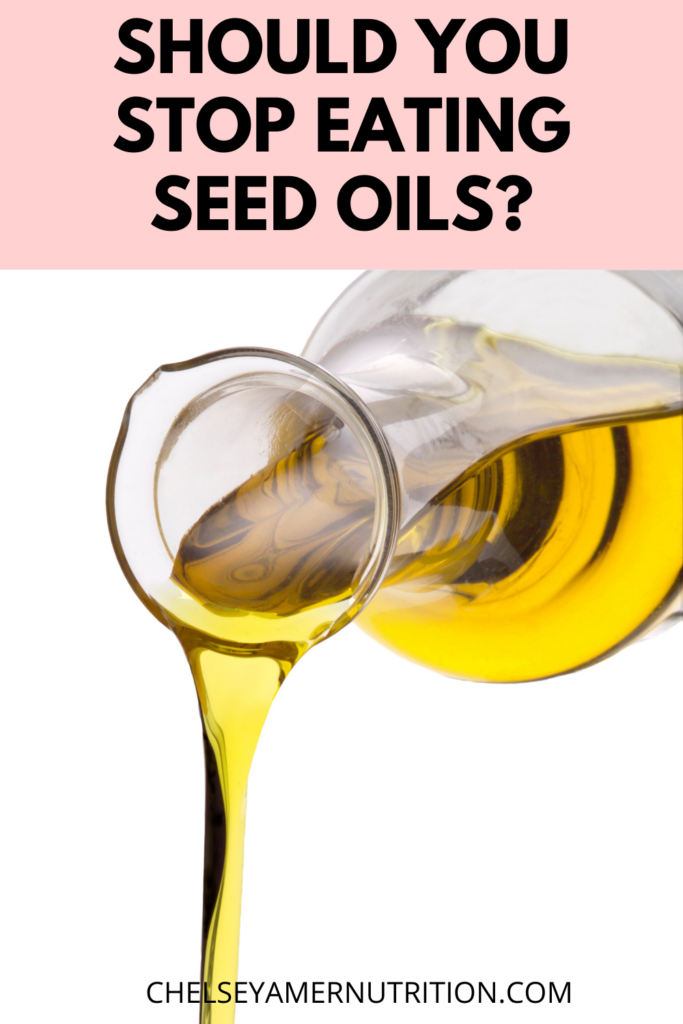Should I Stop Eating Seed Oils?
Social media is hyper-fixating on seed oils, so perhaps you’ve been wondering “Should I Stop Eating Seed Oils?” “Are seed oils bad for my health?” I’m breaking it down in today’s post with science, not scare tactics.

In case you haven’t heard, there’s a loootttt of hype to Make America Healthy Again. A lot of the information I’m seeing on social media is hyper-fixating on seed oils and food dyes.
So perhaps you’ve been wondering “Are seed oils really harming my health?” “Should I stop eating seed oils?” “Can my kids still eat cupcakes at birthday parties?”
Over the next 2 weeks I’m breaking it all down, starting with seed oils…
“Should I stop eating seed oils?”
The Truth About Seed Oils
Seed oils include oils like canola and soybean oils. They contain omega-6 fatty acids, which are essential for the body, meaning your body cannot make omega-6 fatty acids on its own, but NEEDS them for you to survive.
Yes, there are foods that contain omega-6 fatty acids that are not seed oils (sunflower seeds, walnuts, almonds, fish), however, including seed oils as your source of omega-6 fatty acids is just fine.
The concern and detrimental effects from seed oils arises when there’s an imbalance between omega-6 and omega-3s in your body.
An unbalanced ratio of omega-6 to omega-3 fatty acids leads to an increased risk of inflammatory chronic diseases, including heart disease, cancer, and autoimmune diseases.
Recent research suggests that moderate consumption of seed oils does not increase inflammation when balanced with sufficient omega-3 intake.
This is where nutrition gets taken out of context.
Instead of focusing on these details and nuances, many unqualified “health influencers” just like to point fingers at seed oils. However, meta-analyses published in the American Journal of Clinical Nutrition and Circulation show that replacing saturated fats with polyunsaturated fats from seed oils can lower the risk of heart disease.
Nevertheless, excessive consumption in processed foods may contribute to an unhealthy omega-6 to omega-3 ratio.
Essentially, it’s all about my favorite word: BALANCE.
Instead of cutting seed oils out entirely, focus on:
- Limiting highly processed foods regularly
- Incorporating more omega-3-rich foods like salmon, flaxseeds, and walnuts to help balance the ratio of omega-6:omega-3 fatty acids.
Here’s how to put it into ACTION:
- Cook at home exclusively with olive oil or avocado oil
- Eat more nuts, seeds, and fatty fish as your fat sources at meals
- Boost your fiber – fiber helps bind excess fat to flush it out of your body
- Be mindful of highly processed snack foods and baked goods
- If you dine out often (> 1-2 x/week), really focus on limiting highly processed sources of omega-6 fatty acids at home and boost your omega-3 fatty acid intake.
- WHY? Restaurants almost exclusively use seed oils when cooking because they’re much cheaper.
- Eat more WHOLE FOODS (check out my whole foods, easy recipe ebook to help!)
Have questions? Let me know!!
xx


 Hi there!
Thanks for stopping by! I'm Chelsey, an online Registered Dietitian, recipe developer, budding photographer, and coffee addict! My mission is to help you feel good through food by answering the question "What should I eat?" Let's make nutrition approachable!
I hope you enjoy my personal collection of simple, healthy, food allergy friendly and nutritiously delicious recipes, plus tips and tons of tricks that will help YOU live a nutritionally-balanced life! I look forward to getting to know you better...
Hi there!
Thanks for stopping by! I'm Chelsey, an online Registered Dietitian, recipe developer, budding photographer, and coffee addict! My mission is to help you feel good through food by answering the question "What should I eat?" Let's make nutrition approachable!
I hope you enjoy my personal collection of simple, healthy, food allergy friendly and nutritiously delicious recipes, plus tips and tons of tricks that will help YOU live a nutritionally-balanced life! I look forward to getting to know you better...







